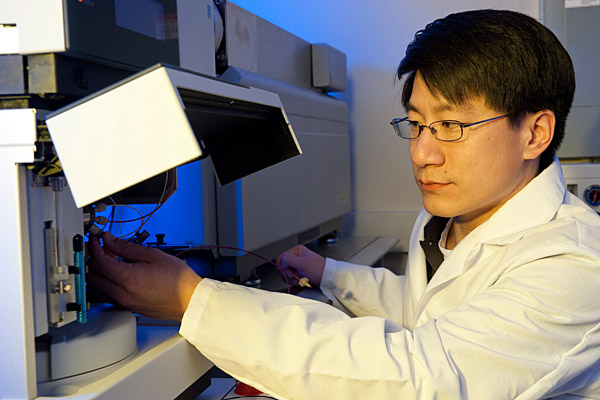NSF grant supports work in systems biology of cells in engineered environments
8:17 a.m., June 7, 2012–With the responsibility of great research comes the requirement of educators to also transcend traditional boundaries by integrating multi-disciplinary knowledge into their work. To do this, they must build a team of experts in other fields to integrate programs that will broaden the capabilities of future leaders. In this case, a group of University of Delaware faculty have been awarded a National Science Foundation grant under the Integrative Graduate Education and Research Traineeship (IGERT) program to train doctoral students in the area of systems biology of cells in engineered environments (SBE2).
Led by principal investigator Kelvin Lee, Gore Professor of Chemical Engineering and director of the Delaware Biotechnology Institute, the grant will bring together experts across the University — drawn from the colleges of Engineering; Agriculture and Natural Resources; Earth, Ocean, and Environment; Arts and Sciences; and Business and Economics — for a comprehensive, intense work/study program designed to create the science leaders of tomorrow.
Co-principal investigators include Cathy Wu, Edward G. Jefferson Chair of Bioinformatics and Computational Biology; Kristi Kiick, deputy dean and professor in the Department of Materials Science and Engineering and of biomedical engineering; Thomas Hanson, associate professor of marine biosciences and biological sciences; and Jia Song, assistant professor of biological sciences.
The five-year, $3 million grant will engage the IGERT Scholars in an important paradigm shift, teaching them critical skills related to science and engineering, as well as bioethics, research ethics, business innovation, communications and outreach to train them to be world leaders in industry, government or academia.
“This proposal represents a novel and comprehensive approach to graduate education in science and engineering,” said Thomas Powers, director of UD’s Center for Science, Ethics and Public Policy and faculty participant in the IGERT. “We intend to prepare students to do good science and to be responsible scientists.”
“Our program brings together two groups of very productive faculty: those working on methods to profile molecules inside cells and those working on cells in a variety of environments such as in tissue engineering applications and in understanding stem cell differentiation,” said Lee. “By encouraging collaboration among the ‘cell-in’ faculty and the ‘cell-out’ faculty, the program seeks to train a new type of Ph.D. student capable of working across traditional disciplinary boundaries while solving some of the most interesting and important problems in the life sciences. ”
IGERT Scholars will have the opportunity to rotate in faculty laboratories, do internships at partner companies and laboratories in Delaware and around the country, and design and implement solutions to important industry problems through an “innovation rotation.”
The most innovative proposals will receive additional funding for implementation during IGERT Scholar internships with industrial partners. Another unique feature of the IGERT SBE2 program is that faculty will also spend time in their colleague’s laboratories to foster interdisciplinary communication.
“Both of these innovative aspects — the industry and faculty rotations — are designed to build the capacity of both the scholars and faculty mentors to communicate and collaborate in multiple arenas,” said Hanson. “This capacity will enhance both student and faculty competitiveness in their future careers.”
The plan to create this IGERT program also includes the launching of a new doctoral program in bioinformatics and systems biology this fall, which will offer an exciting new interdisciplinary home for IGERT Scholars.
“We are thrilled about the synergies between the IGERT program and the new Ph.D. degree program, and the opportunities they bring,” said Wu. “As an interdisciplinary graduate program with scientific curriculum from 16 departments across five colleges, the Ph.D. program will provide a rich curriculum for IGERT Scholars. Conversely, new core courses developed for the IGERT, along with the integrative multidisciplinary research activities, will contribute significantly to the quality of the Ph.D. program and the ability to recruit outstanding students.”
The program will immerse graduate students in a training program connecting biological systems and cells in engineered environments, while coupling novel computational approaches with cutting-edge experimental systems biology techniques.
“The interdisciplinary research and innovation experiences will indeed leave the scholars of this program well-poised for futures in multiple areas,” said Kiick. “The program will also have long-term benefits for the more than 19 UD faculty participants and range of industry partners. The opportunity for the faculty to work closely on projects, classes and industry rotations that merge our strengths in systems biology and engineered environments will allow us to solve a broader range of complex biological problems.”
About IGERT
IGERT is the National Science Foundation’s flagship interdisciplinary training program, educating U.S. doctoral scientists and engineers by building on the foundations of their disciplinary knowledge with interdisciplinary training.
Collaborative research that transcends traditional disciplinary boundaries and requires teamwork provides students with the tools to become leaders in the science and engineering of the future. Diversity among the students contributes to their preparation to solve large and complex research problems of significant scientific and societal importance at the national and international level.
IGERT students obtain the personal and professional skills to succeed in the careers of the 21st century. Since 1998 the IGERT program has made 215 awards to over 100 lead universities in 41 states, the District of Columbia, and Puerto Rico. IGERT has provided funding for nearly 5,000 graduate students.
Article by Laura Crozier
Photo by Evan Krape

